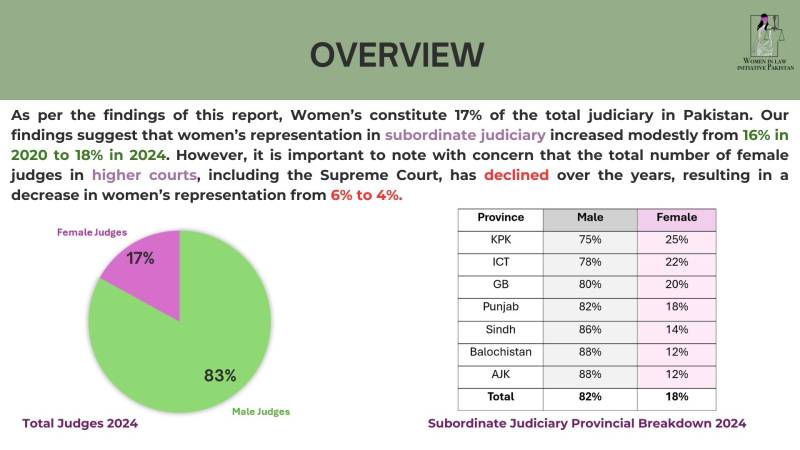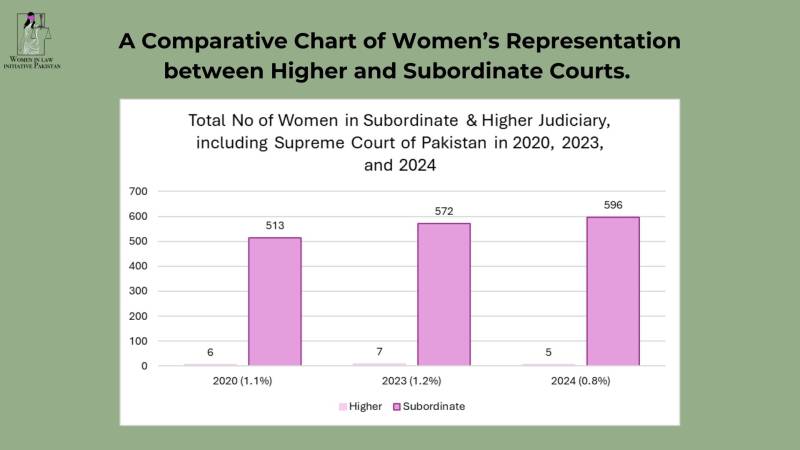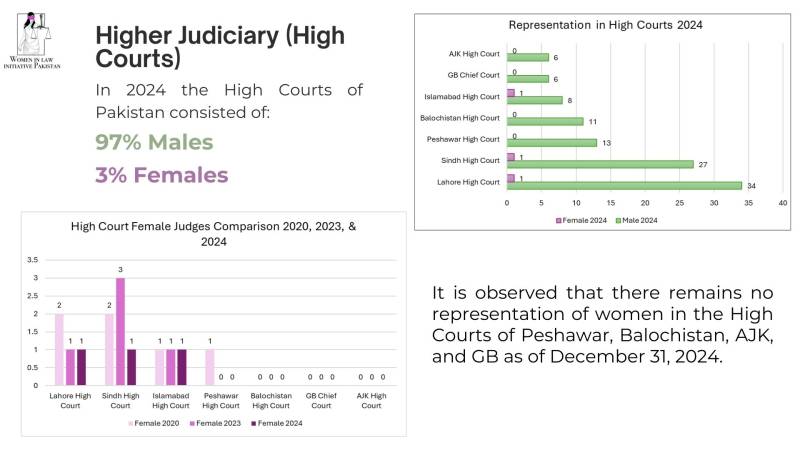
The Women in Law Initiative Pakistan released its annual report on the 'State of Representation of Women in the Judiciary' for the year 2024 on Friday, marking the third anniversary of the 'Day of Women’s Representation in the Supreme Court of Pakistan.'
Since the first female justice took oath in the Supreme Court of Pakistan in 2022, the Initiative commemorates January 24 each year to mark this historic day and take stock of developments regarding gender parity in the judiciary.
"When Pakistan appointed its first female judge to the Supreme Court in 2022, it was the last country in the region to do so," said Nida Usman Chaudhary, founder of the Women in Law Initiative Pakistan.
The report was prepared by Tabeen Sarmad, Programmes Consultant at the Women in Law Initiative Pakistan, with support from Advocate Tayyaba Kakar. The data was collected from official court websites and/or staff during December 12–31, 2024. The report builds on the work done in previous reports from 2020 and 2023 and offers a comparative analysis of trends in gender parity over these years.
The report presents a gender-segregated, tier-wise analysis of the judiciary in Pakistan as of December 31, 2024, highlighting trends in both the subordinate and higher judiciary.

Regarding female judges, overall, there has been a decline in the number of women in higher courts, from 7 in 2023 to 5 in 2024. However, the number of women in subordinate courts has increased from 572 in 2023 to 596 in 2024.

In the subordinate judiciary, Khyber Pakhtunkhwa (KP) remains the leading province in terms of percentage, maintaining 25% representation of women in the subordinate judiciary. Punjab marginally improved from 17% in 2023 to 18% in 2024.
In Sindh, the overall trend shows a 1% increase in women's representation in the subordinate judiciary compared to 2023, bringing it back to the level it was at in 2020-21 (14%). This increase, however, is not due to the induction of more female judges in subordinate courts in Sindh but rather due to a decrease in the number of male judges in subordinate courts, from 620 in 2023 to 597 in 2024.
Balochistan continues to record 12% women's representation in the subordinate judiciary, while Islamabad Capital Territory (ICT) saw a 1% decrease, from 23% in 2023 to 22% in 2024, with no women serving as senior civil judges or district and sessions judges (DSJs).
At the high court level, the Islamabad High Court leads with 12.5% representation, the same as in 2023, followed by the Sindh High Court at 4%. Representation of women in the Lahore High Court has declined from 5% in 2023 to 3% in 2024. Notably, Peshawar, Balochistan, Azad Jammu & Kashmir (AJK), and Gilgit-Baltistan (GB) had 0% representation of female judges in their high courts in 2024.

In GB and AJK, female representation increased by 1% (from 19% to 20% for GB and from 11% to 12% for AJK), but this was only due to a decrease in male judges, from 79 in 2023 to 76 in 2024 in GB, and from 29 in 2023 to 28 in 2024 in AJK. The number of female judges in these provinces remains the same as in 2023.
The total number of women judges in the higher judiciary (including the Supreme Court) dropped from 7 in 2023 to 5 in 2024. This includes 2 women in the Supreme Court and 3 women in three of the seven high courts included in this report.
"It is a bittersweet result because while women’s representation in the subordinate judiciary has increased from 16% in 2020 to 18% in 2024 and shows consistent improvement each year, in the higher courts it has regressed. Women’s representation decreased from 6% in 2023 to 4% in 2024, which is where it matters the most. Therefore, the pace of progress is very slow and leaves much to be desired, particularly in the higher judiciary," said Tabeen Sarmad.

